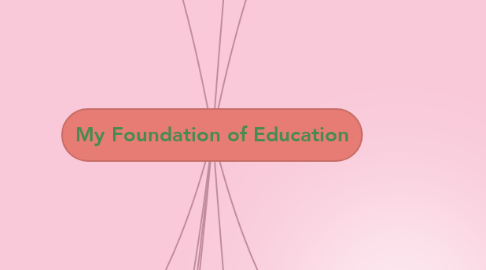
1. Politics of Education
1.1. Specific Purposes
1.1.1. Intellectual-cognitive skills to ensure analysis, evaluation, & synthesis
1.1.2. Political- allegiance to political order; basic laws
1.1.3. Social- stability of society
1.1.4. Economic- roles in life during adulthood
1.2. Political Perspective
1.2.1. Conservative- to earn or not earn your place in society
1.2.2. Liberal- economic productivity within mean of overall good of people
1.2.3. Radical- favor democratic socialism
1.3. Visions of Education
1.3.1. Traditional- used to transmit traditional US values of society
1.3.2. Progressive
1.3.2.1. Solving social problems
1.3.2.2. Vehicle to mobility
1.3.2.3. Essential for potential
1.4. CH2
1.4.1. The Role of the school
1.4.2. Unequal educational performance
1.4.3. Educational problems
1.4.4. The American Dream
1.4.5. Policy and reform
2. History of U.S. Education
2.1. CH. 3
2.2. Reforms: Public Schools
2.3. Progressive/Tradition cylcles
2.4. Equality
2.5. Standards Era
2.6. Old Deluder Laws- Parents were held responsible for a child's education and communities were responsible for employing teachers
2.7. Merirocracy-
2.8. Utilitarianism-
2.9. Civic Motive
2.10. Common School- Taxation for schools unjust
2.11. Benjamin Fraklin
2.12. Brown vs. Board of Education
2.13. Embroyonic Community
2.14. Child-Centered Reform
2.15. Social engineering Reform
3. Sociological Perspectives
3.1. Persell's 1970
3.2. CH. 4
3.3. 3 Major Theories: School and Society
3.3.1. Weberian Approach
3.4. 5 Effects: Schooling on Individuals
3.5. Social and Economic Inequality
3.6. pg. 114- Levels of sociological analysis societal, institutional interpersonal; sociological perspective
3.7. pg. 115- functionalism and conflict theory
3.8. pg. 116 socialization
3.9. pg. 117 Theory
3.10. Determinism- whether individuals actions are determined by external forces pg. 114
3.11. Voluntarism- whether individuals are capable of freely shaping the world pg. 119
3.12. Socialization Theory- schools, parents, and churches shape children's perceptions of the world 9g. 116-117
3.13. Interdependence- dependent on others for certain needs
3.14. Cultural capital- knowledge and experiences related to art, music, and literature
3.15. SOCIAL CAPITAL- social network and connections
4. Philosophy of Education
4.1. Maxine Green
4.1.1. Contemporary
4.2. Pg. 190 Bottom: Thus, individuals are in a state of constantly becoming, creating chaos and order, creating good and evil.
4.3. Modern Philosophy but dates back to the Bible
4.4. Soren Kierkergaard
4.5. CH. 5
4.6. Existentialism
4.6.1. http://www.allaboutphilosophy.org/existentialism.htm
4.6.1.1. WHAT IT IS>> Human free will Human nature is chosen through life choices A person is best when struggling against their individual nature, fighting for life Decisions are not without stress and consequences There are things that are not rational Personal responsibility and discipline is crucial Society is unnatural and its traditional religious and secular rules are arbitrary Worldly desire is futile
4.6.1.2. WHAT IT IS NOT>>>wealth, pleasure, or honor make the good life social values and structure control the individual accept what is and that is enough in life science can and will make everything better people are basically good but ruined by society or external forces “I want my way, now!” or “It is not my fault!” mentality
4.6.2. a philosophical theory or approach that emphasizes the existence of the individual person as a free and responsible agent determining their own development through acts of the will.
5. Schools as Organizations.
5.1. CH. 6
5.2. 5 Structures: US Education
5.3. U.S> vs. International
5.4. Teacher Professionalism
5.5. "School Processes"- way in which school cultures are maintained and created
5.6. Out-of-Field teaching- teachers are not highly qualified
5.7. "Decentralized Schools"
5.8. Consolidation
5.9. Centeralization
5.10. De jure Segregation
5.11. De facto Segregation
5.12. Openness- "common school"
5.13. "Culture of schools" Waller, 1965
5.14. "social organizations"
5.15. Bureaucracy Weber, 1976
5.16. Highly qualified- college degree, full certification, demonstrate content knowledge
5.17. Role Switching- teachers expected to be colleague, friend, nurturer, facilitator, researcher, program developer, administrator, decision maker, professional leader, community activist, and caring role model at any given time, BURNT OUT!!
5.18. "social realities of teaching" Lieberman & Miller, 1984
5.19. "contradictions of control" McNeil, 1988
6. Curriculum and Pedagogy
6.1. Local, State, and National Certification
6.2. Major Stakeholders
6.3. approach to curriculum
6.4. 2 dom tradi in PP
6.5. 3 Approaches to Curriculum
6.6. pedagogic practice
6.7. Translation of values
6.8. CH. 7
6.9. pedagogical progressivism- relationship between schooling and activities within society pg 283
6.10. Four Types of Curriculum
6.11. Different Srakeholders
6.12. Contemporary critical curriculum theory- social efficiency model; also see social meliorist curriculum pg 285/284
6.13. romantic progressive-"open" & "free" pg284
7. Equality of Opportunity
7.1. CH. 8
7.2. Programs
7.2.1. No Child left Behind
